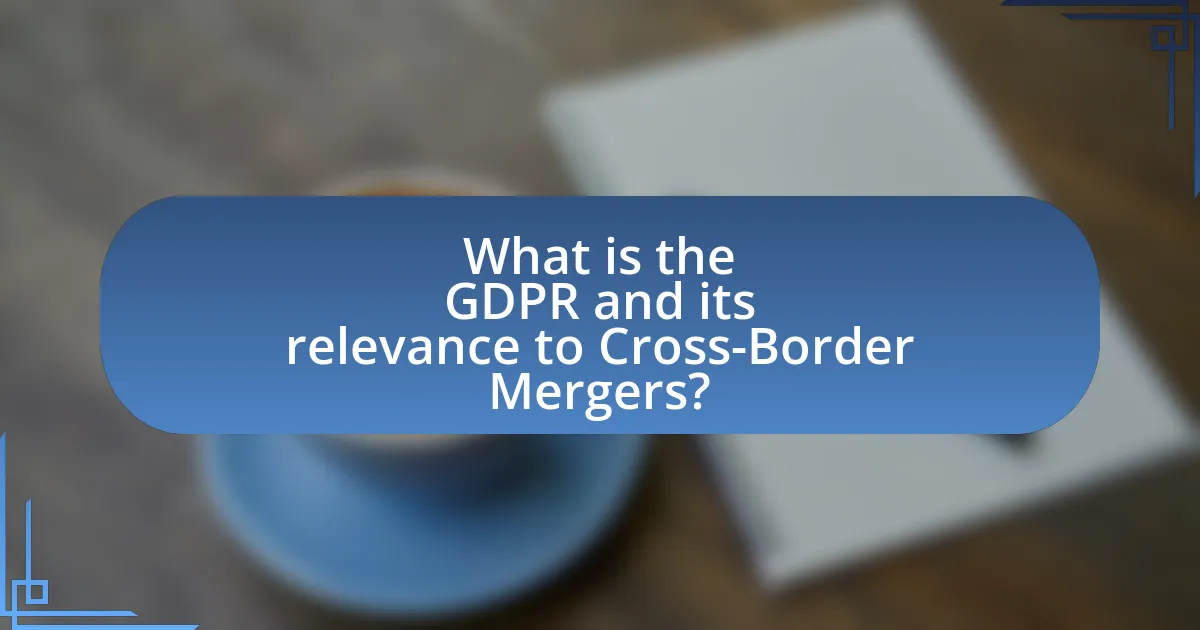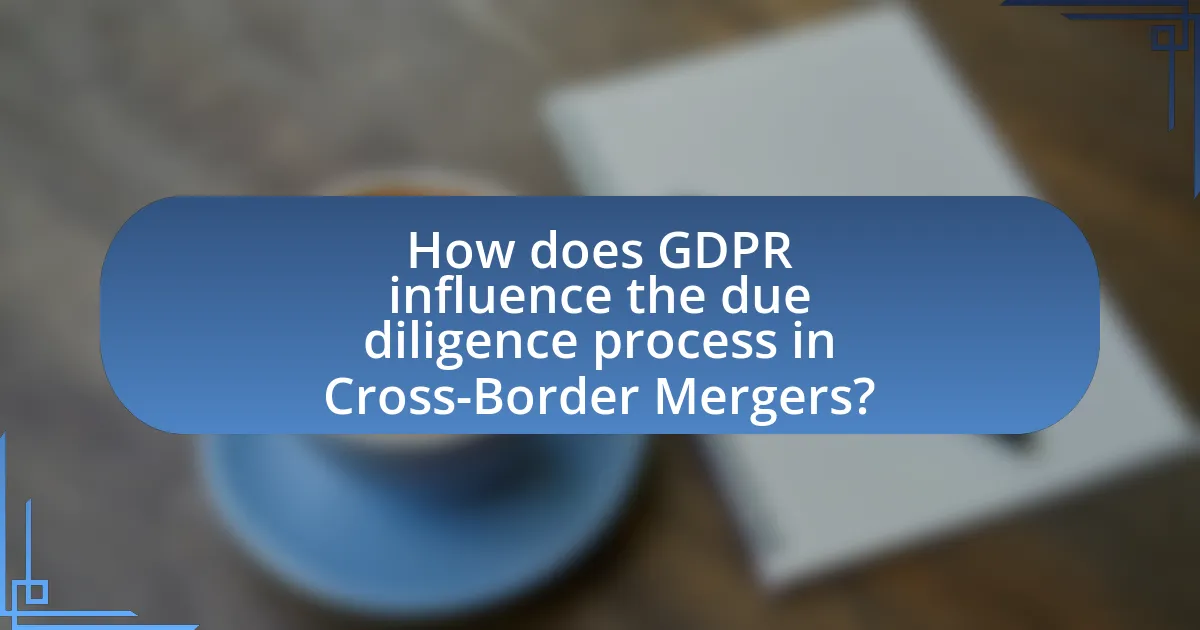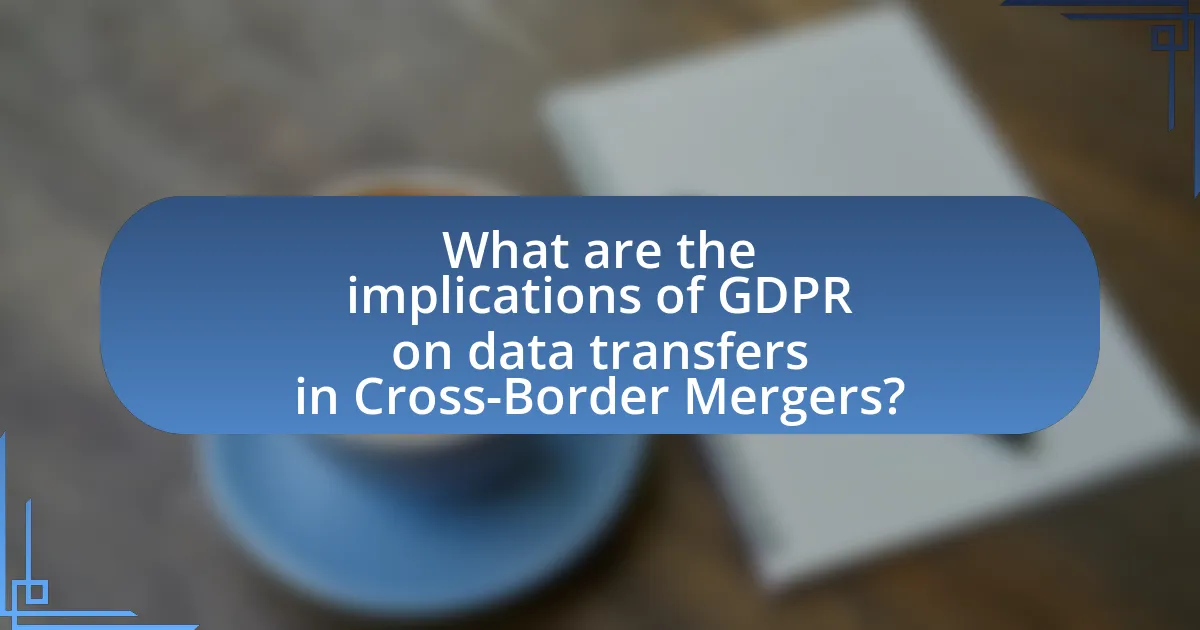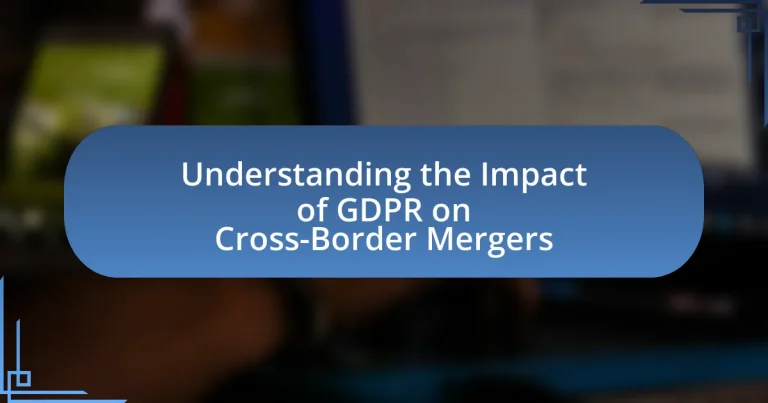The General Data Protection Regulation (GDPR) is a critical data protection law in the European Union that significantly impacts cross-border mergers. This article explores the relevance of GDPR in such mergers, detailing its stringent requirements for handling personal data, the definition of personal data, and the types most affected during mergers. It also examines the legal consequences of non-compliance, the importance of GDPR compliance for stakeholder trust, and the challenges companies face in navigating differing national interpretations of data protection laws. Additionally, the article outlines best practices for ensuring GDPR compliance during the due diligence and integration phases of mergers, as well as mechanisms for lawful data transfers.

What is the GDPR and its relevance to Cross-Border Mergers?
The General Data Protection Regulation (GDPR) is a comprehensive data protection law in the European Union that governs the processing of personal data. Its relevance to cross-border mergers lies in its stringent requirements for data handling, which companies must comply with when merging operations across different jurisdictions. Specifically, GDPR mandates that organizations ensure adequate data protection measures are in place, which can complicate the merger process by necessitating thorough assessments of data practices and potential liabilities related to personal data. Non-compliance can result in significant fines, making adherence to GDPR a critical factor in the success of cross-border mergers.
How does GDPR define personal data in the context of mergers?
GDPR defines personal data as any information relating to an identified or identifiable natural person, which is crucial in the context of mergers. This definition encompasses a wide range of data, including names, identification numbers, location data, and online identifiers, which can be processed during the merger process. The relevance of this definition in mergers lies in the requirement for organizations to ensure compliance with data protection principles when handling personal data of individuals involved in or affected by the merger, as outlined in Articles 4 and 5 of the GDPR.
What types of personal data are most affected during cross-border mergers?
During cross-border mergers, the types of personal data most affected include employee data, customer data, and financial data. Employee data encompasses personal identifiers, employment history, and performance evaluations, which are critical for assessing workforce integration. Customer data involves personal information such as names, contact details, and purchase histories, essential for maintaining business relationships and compliance with data protection regulations. Financial data includes personal financial information related to transactions and credit histories, which are vital for evaluating the financial health of the merging entities. The General Data Protection Regulation (GDPR) mandates strict guidelines on the handling of such data, emphasizing the need for lawful processing and cross-border data transfer compliance, thereby impacting how these data types are managed during mergers.
How does the definition of personal data vary across different jurisdictions?
The definition of personal data varies significantly across different jurisdictions, primarily influenced by local laws and regulations. For instance, the European Union’s General Data Protection Regulation (GDPR) defines personal data as any information relating to an identified or identifiable natural person, encompassing a wide range of identifiers such as names, identification numbers, and location data. In contrast, the United States lacks a comprehensive federal definition, with personal data often defined through sector-specific laws, such as the Health Insurance Portability and Accountability Act (HIPAA) for health information, which focuses on medical data rather than a broad definition of personal data. Additionally, countries like Brazil, under the Lei Geral de Proteção de Dados (LGPD), align closely with the GDPR’s definition but also include specific provisions for sensitive data, such as racial or ethnic origin. These variations highlight the complexities organizations face when navigating cross-border mergers, as compliance with differing definitions of personal data is essential for legal adherence and risk management.
Why is GDPR compliance crucial for companies involved in cross-border mergers?
GDPR compliance is crucial for companies involved in cross-border mergers because it ensures the protection of personal data across different jurisdictions. Non-compliance can lead to significant fines, which can reach up to 4% of a company’s global annual revenue or €20 million, whichever is higher, as stipulated by the regulation. Furthermore, GDPR mandates that companies must have a lawful basis for processing personal data, which is essential during mergers that often involve the transfer of large amounts of sensitive information. This legal framework not only safeguards individual privacy rights but also fosters trust among stakeholders, which is vital for the success of any merger.
What are the potential legal consequences of non-compliance with GDPR?
Non-compliance with GDPR can result in significant legal consequences, including hefty fines and sanctions. Organizations may face fines of up to €20 million or 4% of their annual global turnover, whichever is higher, as stipulated in Article 83 of the GDPR. Additionally, non-compliance can lead to legal actions from affected individuals, who may seek compensation for damages caused by data breaches or mishandling of personal data. Regulatory authorities can also impose restrictions on data processing activities, potentially halting business operations until compliance is achieved.
How can GDPR compliance enhance trust among stakeholders in a merger?
GDPR compliance enhances trust among stakeholders in a merger by ensuring that personal data is handled transparently and securely. This regulation mandates organizations to implement strict data protection measures, which reassures stakeholders that their information is safeguarded against misuse. For instance, companies that adhere to GDPR are required to conduct data protection impact assessments and maintain clear communication about data processing activities, fostering a culture of accountability. Research indicates that organizations demonstrating strong data governance practices, such as GDPR compliance, are perceived as more trustworthy, leading to increased confidence among investors, employees, and customers during the merger process.
What challenges do companies face regarding GDPR during cross-border mergers?
Companies face significant challenges regarding GDPR during cross-border mergers, primarily due to differing interpretations and implementations of data protection laws across jurisdictions. The General Data Protection Regulation mandates strict compliance with data privacy standards, which can vary between EU member states and non-EU countries. This inconsistency complicates the integration of data systems and processes, as companies must navigate various legal frameworks while ensuring compliance with GDPR’s requirements, such as obtaining consent for data processing and ensuring data subject rights are upheld. Additionally, the potential for hefty fines—up to 4% of global annual turnover—creates a high-stakes environment where companies must meticulously assess their data handling practices during the merger process to avoid legal repercussions.
How do differing national interpretations of GDPR impact merger processes?
Differing national interpretations of GDPR significantly impact merger processes by creating inconsistencies in compliance requirements across jurisdictions. For instance, while some countries may adopt a strict approach to data protection, others might allow more flexibility, leading to challenges in aligning merger strategies with varying legal standards. This divergence can result in delays as companies navigate the complexities of obtaining necessary approvals from multiple regulatory bodies, which may have different expectations regarding data handling and privacy assessments. Additionally, the risk of non-compliance increases, as companies may inadvertently violate local regulations if they do not fully understand the specific interpretations in each country involved in the merger.
What are the common pitfalls companies encounter when navigating GDPR in mergers?
Companies commonly encounter pitfalls such as inadequate data mapping, failure to conduct proper due diligence, and insufficient integration of data protection measures when navigating GDPR in mergers. Inadequate data mapping can lead to a lack of clarity regarding the personal data being transferred, which is essential for compliance. Failure to conduct proper due diligence may result in overlooking existing data protection issues within the merging entities, potentially exposing the new entity to regulatory fines. Insufficient integration of data protection measures can hinder the ability to comply with GDPR requirements post-merger, as companies may not align their data handling practices effectively. These pitfalls can lead to significant legal and financial repercussions, as evidenced by the European Data Protection Board’s emphasis on the importance of compliance during mergers and acquisitions.

How does GDPR influence the due diligence process in Cross-Border Mergers?
GDPR significantly influences the due diligence process in cross-border mergers by imposing strict requirements on the handling of personal data. Companies involved in such mergers must assess compliance with GDPR regulations, which include ensuring that data protection measures are in place and that any transfer of personal data across borders adheres to legal standards. This necessitates thorough evaluations of data processing activities, potential risks, and the implementation of appropriate safeguards, such as data protection impact assessments. Non-compliance can lead to substantial fines, as evidenced by the European Data Protection Board’s enforcement actions, which highlight the importance of adhering to GDPR during mergers.
What specific GDPR-related factors should be assessed during due diligence?
During due diligence, specific GDPR-related factors that should be assessed include the data processing activities of the target company, compliance with data subject rights, data transfer mechanisms, and existing data protection policies. Evaluating the data processing activities helps identify how personal data is collected, stored, and used, ensuring alignment with GDPR principles. Assessing compliance with data subject rights, such as access, rectification, and erasure, is crucial to determine the target’s ability to meet legal obligations. Reviewing data transfer mechanisms, particularly for cross-border data transfers, ensures that appropriate safeguards are in place, such as Standard Contractual Clauses or adequacy decisions. Lastly, examining existing data protection policies provides insight into the target’s commitment to GDPR compliance and risk management practices.
How can companies identify potential GDPR compliance risks in target firms?
Companies can identify potential GDPR compliance risks in target firms by conducting thorough due diligence assessments that include data protection audits, reviewing privacy policies, and evaluating data processing activities. These assessments should focus on understanding how the target firm collects, processes, and stores personal data, as well as their mechanisms for obtaining consent and ensuring data subject rights. For instance, a study by the European Data Protection Board highlights that firms must assess the adequacy of data protection measures in place, including technical and organizational safeguards. Additionally, companies should analyze any past data breaches or regulatory fines faced by the target firm, as these can indicate vulnerabilities in compliance.
What role does data mapping play in the due diligence process?
Data mapping plays a critical role in the due diligence process by identifying and documenting the flow of personal data within an organization. This process is essential for ensuring compliance with GDPR regulations, which mandate transparency regarding data handling practices. By mapping data, organizations can assess risks associated with data transfers, identify potential liabilities, and ensure that all data processing activities are compliant with legal requirements. Furthermore, data mapping facilitates the identification of data sources, storage locations, and processing purposes, which are crucial for evaluating the implications of cross-border mergers under GDPR.
How can companies ensure GDPR compliance during the merger integration phase?
Companies can ensure GDPR compliance during the merger integration phase by conducting thorough data audits and implementing robust data protection policies. This involves identifying all personal data being processed, assessing the legal basis for processing, and ensuring that data subjects’ rights are upheld. Additionally, companies should integrate privacy by design into their systems and processes, ensuring that data protection measures are embedded from the outset. Regular training for employees on GDPR requirements and appointing a Data Protection Officer can further enhance compliance. According to the European Data Protection Board, organizations must demonstrate accountability and transparency in their data handling practices, which is crucial during mergers.
What best practices should be followed for data protection post-merger?
Best practices for data protection post-merger include conducting a comprehensive data audit, ensuring compliance with GDPR, and implementing robust data governance frameworks. A comprehensive data audit identifies all data assets and assesses their compliance with data protection regulations, which is crucial for mitigating risks associated with data breaches. Compliance with GDPR mandates that organizations must have a clear understanding of data processing activities and ensure that data subjects’ rights are upheld. Implementing robust data governance frameworks establishes policies and procedures for data management, ensuring accountability and transparency in data handling. These practices are essential for protecting sensitive information and maintaining trust with stakeholders in the context of cross-border mergers.
How can companies train employees on GDPR compliance during integration?
Companies can train employees on GDPR compliance during integration by implementing structured training programs that include workshops, e-learning modules, and practical case studies. These programs should focus on the key principles of GDPR, such as data protection rights, lawful processing, and data breach protocols. For instance, organizations can utilize real-life scenarios to illustrate the implications of non-compliance, thereby reinforcing the importance of adhering to GDPR regulations. Additionally, regular assessments and updates on GDPR changes can ensure that employees remain informed and compliant. Research indicates that organizations with comprehensive training programs experience a 30% reduction in data breaches, highlighting the effectiveness of targeted employee education on GDPR compliance.

What are the implications of GDPR on data transfers in Cross-Border Mergers?
The implications of GDPR on data transfers in cross-border mergers are significant, as the regulation mandates strict conditions for transferring personal data outside the European Economic Area (EEA). Organizations involved in such mergers must ensure that any data transfer complies with GDPR requirements, which include establishing an adequate level of data protection in the receiving country or implementing appropriate safeguards, such as Standard Contractual Clauses or Binding Corporate Rules. Non-compliance can lead to substantial fines, as evidenced by the European Data Protection Board’s enforcement actions, which have resulted in penalties exceeding €400 million in 2020 alone. Therefore, companies must conduct thorough due diligence and risk assessments to align their data transfer practices with GDPR standards during cross-border mergers.
What mechanisms are available for lawful data transfers under GDPR?
Lawful data transfers under GDPR can occur through several mechanisms, including adequacy decisions, standard contractual clauses, binding corporate rules, and specific derogations. Adequacy decisions are made by the European Commission, determining that a non-EU country provides an adequate level of data protection. Standard contractual clauses are pre-approved contracts that ensure compliance with GDPR when transferring data outside the EU. Binding corporate rules are internal policies adopted by multinational companies to ensure adequate data protection across their global operations. Specific derogations, such as explicit consent from the data subject or necessity for the performance of a contract, also allow for lawful transfers. These mechanisms are established to ensure that personal data remains protected even when transferred internationally, aligning with GDPR’s core principles.
How do Standard Contractual Clauses facilitate data transfers in mergers?
Standard Contractual Clauses (SCCs) facilitate data transfers in mergers by providing a legally binding framework that ensures compliance with data protection regulations, particularly under the General Data Protection Regulation (GDPR). SCCs establish specific obligations for data exporters and importers, ensuring that personal data is adequately protected during cross-border transfers. This legal mechanism is crucial for companies involved in mergers, as it allows them to transfer necessary data between entities located in different jurisdictions while adhering to GDPR requirements. The European Commission has recognized SCCs as a valid tool for ensuring that data protection standards are maintained, thereby enabling smoother and compliant data sharing during the merger process.
What role do Binding Corporate Rules play in cross-border data transfers?
Binding Corporate Rules (BCRs) serve as a mechanism for multinational companies to ensure compliance with data protection laws when transferring personal data across borders. BCRs establish a framework that allows organizations to transfer data outside the European Economic Area while maintaining adequate protection standards as required by the General Data Protection Regulation (GDPR). Specifically, BCRs must be approved by relevant data protection authorities, demonstrating that the organization has implemented sufficient safeguards to protect personal data, thereby facilitating lawful cross-border data transfers.
How can companies mitigate risks associated with international data transfers?
Companies can mitigate risks associated with international data transfers by implementing robust data protection measures, such as encryption, data anonymization, and compliance with legal frameworks like the General Data Protection Regulation (GDPR). These measures ensure that personal data is safeguarded during transit and that companies adhere to strict regulatory requirements, reducing the likelihood of data breaches and legal penalties. For instance, the GDPR mandates that organizations demonstrate adequate protection for personal data transferred outside the European Union, which can be achieved through Standard Contractual Clauses (SCCs) or Binding Corporate Rules (BCRs). By adopting these strategies, companies can effectively manage the complexities and risks inherent in cross-border data flows.
What strategies can be implemented to ensure ongoing GDPR compliance during data transfers?
To ensure ongoing GDPR compliance during data transfers, organizations should implement strategies such as conducting Data Protection Impact Assessments (DPIAs), utilizing Standard Contractual Clauses (SCCs), and ensuring adequate data protection measures in third countries. DPIAs help identify and mitigate risks associated with data transfers, while SCCs provide a legal framework for transferring personal data outside the EU, ensuring that the receiving party adheres to GDPR standards. Additionally, organizations must regularly review and update their data protection policies and practices to align with evolving regulations and ensure that any third-party processors comply with GDPR requirements. These strategies collectively reinforce compliance and protect individuals’ data rights during cross-border mergers.
How can companies prepare for potential regulatory scrutiny regarding data transfers?
Companies can prepare for potential regulatory scrutiny regarding data transfers by implementing comprehensive data protection policies and ensuring compliance with GDPR requirements. This includes conducting regular audits of data transfer practices, establishing clear data processing agreements with third parties, and ensuring that adequate safeguards, such as Standard Contractual Clauses or Binding Corporate Rules, are in place. According to the European Data Protection Board, organizations must demonstrate accountability and transparency in their data handling processes to mitigate risks associated with regulatory scrutiny.
What are the best practices for navigating GDPR in Cross-Border Mergers?
The best practices for navigating GDPR in cross-border mergers include conducting thorough data protection impact assessments, ensuring compliance with local data protection laws, and establishing clear data transfer agreements. Conducting data protection impact assessments helps identify risks associated with personal data processing during the merger, which is crucial for compliance with GDPR Article 35. Ensuring compliance with local data protection laws is essential, as different EU member states may have specific regulations that complement GDPR. Establishing clear data transfer agreements, particularly when transferring data outside the EU, is necessary to comply with GDPR Article 46, which mandates appropriate safeguards for international data transfers. These practices collectively help mitigate legal risks and ensure adherence to GDPR requirements during cross-border mergers.
How can companies develop a comprehensive GDPR compliance strategy for mergers?
Companies can develop a comprehensive GDPR compliance strategy for mergers by conducting thorough data audits, ensuring transparency in data processing, and implementing robust data protection measures. A data audit identifies all personal data held by both merging entities, assessing its compliance with GDPR requirements. Transparency involves informing data subjects about the merger and how their data will be used, which is crucial for maintaining trust and legal compliance. Additionally, implementing data protection measures, such as encryption and access controls, safeguards personal data during and after the merger process. These steps are essential as GDPR mandates strict adherence to data protection principles, and failure to comply can result in significant fines, which can reach up to 4% of annual global turnover or €20 million, whichever is higher.
What resources are available to assist companies in understanding GDPR requirements?
Companies can access various resources to understand GDPR requirements, including official guidelines from the European Commission, which provide comprehensive information on compliance. Additionally, the Information Commissioner’s Office (ICO) in the UK offers detailed resources, including toolkits and checklists tailored for businesses. Legal firms specializing in data protection law also publish white papers and conduct seminars that clarify GDPR implications. Furthermore, industry associations often provide training sessions and webinars focused on GDPR compliance, ensuring that companies stay informed about their obligations under the regulation.


